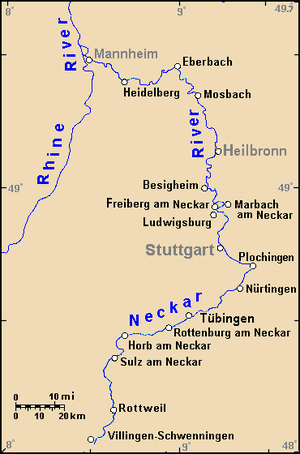Neckar
| Author:Laxman Burdak, IFS (R) |

Neckar (German: [ˈnɛkaʁ]) is a 362-kilometre-long river in Germany, mainly flowing through the southwestern state of Baden-Württemberg, with a short section through Hesse. The Neckar is a major right tributary of the Rhine.
Variants
- Neckar River
- Neckar Suebi - tribe
Jat clans
Etymology
The name Neckar may be derived from Nicarus and Neccarus from Celtic Nikros, meaning wild water or wild fellow. The grammatical gender of the name in German is masculine (der Neckar).
Course
Rising in the Schwarzwald-Baar-Kreis near Schwenningen in the Schwenninger Moos conservation area at a height of 706 m above sea level, it passes through Rottweil, Rottenburg am Neckar, Kilchberg, Tübingen, Wernau, Nürtingen, Plochingen, Esslingen, Stuttgart, Ludwigsburg, Marbach, Heilbronn and Heidelberg, before discharging water into the Rhine at Mannheim, at 95 m (312 ft) above sea level.
From Plochingen to Stuttgart, the Neckar valley is densely populated and heavily industrialised, with several well-known companies. Between Stuttgart and Lauffen, the Neckar cuts a scenic, meandering, and in many places steep-sided, valley into fossiliferous Triassic limestones and Pleistocene travertine. Along the Neckar's valley in the Odenwald hills many castles can be found, including Hornberg Castle and Guttenberg Castle [de; lb; ru; uk] in Haßmersheim; the now-mothballed Obrigheim Nuclear Power Plant and the active Neckarwestheim Nuclear Power Plant are also located there. The Neckar in southwest Germany flows from south to north, and joins the Rhine at Mannheim.
Traditionally the fertile plains have been intensively used for agriculture and its steep valley sides as vineyards.
Tribe
Neckar Suebi - Romanised tribe of the Suebi on Neckar River, who lived in the 1st and 2nd century in the area of Ladenburg on Neckar River in Germany.
History
Mannheim
Mannheim (German: [ˈmanhaɪm]) is the second-largest city in the German state of Baden-Württemberg after the state capital of Stuttgart. Mannheim is located at the confluence of the Rhine and the Neckar in the Kurpfalz (Electoral Palatinate) region of northwestern Baden-Württemberg. The city lies in the Upper Rhine Plain, Germany's warmest region.
Early history: A brick kiln excavated in 1929 in the Seckenheim district, which operated from 74 AD to the early second century, attests to settlement in Roman times.[1]
The name of the city was first recorded as Mannenheim in a legal transaction in 766, surviving in a twelfth-century copy in the Codex Laureshamensis from Lorsch Abbey.[2] The name is interpreted as "the home of Manno", a short form of a Germanic name such as Hartmann or Hermann.[3] Mannheim remained a mere village throughout the Middle Ages.
External links
References
- ↑ Emmi., Brandi, Ulrike, 1957- Federhofer (2010). Ton + Technik : römische Ziegel. Limesmuseum Aalen, Zweigmuseum des Archäologischen Landesmuseums Baden-Württemberg. ISBN 978-3-8062-2403-0. OCLC 610821190.
- ↑ "Minst, Karl Josef [Transl.]: Lorscher Codex: deutsch ; Urkundenbuch der ehemaligen Fürstabtei Lorsch (Band 2): Schenkungsurkunden Nr. 167 - 818, Oberrheingau und Ladengau (Lorsch, 1968)". digi.ub.uni-heidelberg.de.
- ↑ Sonja Steiner-Welz, 400 Jahre Stadt Mannheim (Dokumente zur Stadtgeschichte). Band 1: bis zur Kaiserzeit, vol. 1, 2004, ISBN 978-3-936041-96-5, p. 41.
Back to Rivers

